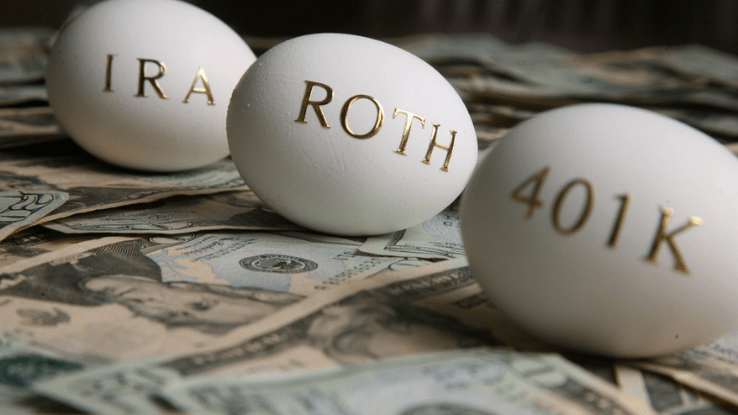How to Open a Saving Account for Baby

Forget about the good old days when you could rely on an employee pension plan and Social Security to cover the cost of your retirement years. Today's economy requires a well-laid-out retirement plan.
Unfortunately, saving for retirement isn't a one-size-fits-all kind of process. Everyone's situation is unique and, as such, you need to find a retirement account that best caters to your individual job situation and retirement goals. Here's a guide to help you find the best retirement savings accounts to secure your future.

Some people will call it a retirement savings plan, others will call it a retirement savings program, it doesn't really matter. All these terms are coined to represent a place and a strategy for putting some money aside before retirement to help you with expenses in the future.
This may seem like an all-too-early thing to do, especially if you are younger, but truth be told, it's never too early to secure your future. Besides, having a retirement savings account gives you access to a tax-deferred retirement account, which will reduce the taxes you pay. How is that for motivation?
Types of Retirement Savings Accounts

Now that you know what a retirement savings account is, and why you'd be better off having one, you are ready to delve into the different types of accounts available. At first, these different types of accounts may appear overwhelming, or maybe a bit confusing. But, nothing a good simple explanation won't fix so let's begin. After we introduce some of the options available, we'll count down five of the best.
1. The 401(k)
Sounds familiar? That's probably because it is one of the most mentioned retirement savings accounts in the USA. A 401(k) account is obtained through employers. This means you have to be employed to get your 401(k) account, but not every workplace offers this plan.
When it comes to contributions, the IRS allows you to put in at most $19,500 to your 401(k) account if you are below 50 years old. In case you are 50 or older, then you can put up to $26,000 in your account. Ultimately, you can start making over-the-counter withdrawals from the account once you turn 72 years old. Penalties may apply if you try to withdraw before age 59 and a half.
2. Solo 401(k)
What about self-employed individuals, do they get retirement saving plans? Yes, they do. These are known as Solo 401 (k) or one-participant 401(k) plans. This account is eligible for an individual business owner who has no employees. The IRS allows you contributions of up to $58,000. For people aged 50 or older, catch-up contributions of up to $6,500 are allowed.
3. 403(b)
In case you work for nonprofit or tax-exempt organizations you can also plan for your retirement through the 403(b) account. It comes with the same contribution limitations as a 401(k) plan and lets your earnings grow tax-free until you start withdrawing, at which point the amounts withdrawn are subject to income tax.
4. IRA
In full, "IRA" means "individual retirement account". This is a retirement savings plan available only for people with earned income. Earned income refers to all the taxable income and wages obtained from work or certain disability payments. IRA's contribution limit is $6,000 or $7,000 if you are 50 or older, and the funds you withdraw become taxable income. IRAs also come in other variants like self-directed IRAs, and SIMPLE IRAs and SEP IRAs that cater to self-employed individuals or business owners with few employees.
5. Roth IRA
For Roth IRA, you must also have earned income. The contribution and age limits are also similar to IRAs. The only difference is that with a Roth IRA, you have to pay taxes on the amount you contribute. However, at the time of withdrawal, the money you withdraw will be tax-free. As much as this retirement savings account comes with an impressive tax benefit, the eligibility to contribute to it is fully dependent on having earned income. Besides, it only offers you tax savings if you have a higher tax rate in retirement.
6. Thrift Savings Plan
The Thrift Savings Plan (TSP) is quite similar to the 401(k) plan. The only difference is, it's available to government workers and members of the uniformed services only.
Should you be eligible, you will choose to put your money into five low-cost investment options, namely: a bond fund, a small-cap fund, an S&P 500 index fund, an international stock fund, and a fund that invests in specially issued Treasury securities. The returns you get from these investments will be accessible when you retire.
7. Guaranteed Income Annuities ("GIAs")
Alternatively, you can buy GIAs to create your own pension. For this, you will need to trade a huge amount of money at retirement and buy an immediate annuity. This means you get a monthly payment for life. Or you can opt for deferred income annuities, where you pay bits of the annuity over time to get monthly payment post-retirement.
Best Savings Accounts for Retirement

There is a litany of retirement savings accounts that you can get. But as earlier mentioned, you need to choose one that is based on your employment situation and your future goals. With this in mind, we would rank the following as the best savings accounts for any retiree.
5. IRA
This is a good option because you can also use it to buy an almost limitless number of investments like stocks. It also doesn't come with tax deductions until you withdraw the money at retirement. The downside of an IRA is that the withdrawals tend to be very costly because of income tax deductions.
4. Guaranteed Income Annuities ("GIAs")
This is also a great plan, mostly because it cuts through all the tax red tape. With GIAs, you can choose to only pay tax for the annuity's earnings.
3. The 401(k)
The 401(k) is a handy retirement savings plan, especially if you are not very good at saving up once you get money in your account. With this plan, you can simply schedule money directly from your paycheck and have it invested automatically before it ever gets to you.
2. Solo 401(k)
If you have a small business owner or are self-employed and have no employees, this is better than a SIMPLE IRA, because you can invest more into it. It may however be a bit complex to set up.
1. Roth IRA
This is the king of retirement saving accounts. For the fact that you can run it as an individual, have the chance to avoid taxes on all money withdrawn, and still have the flexibility to take out contributions at any time without taxes or penalties, a Roth IRA is certainly an impressive choice.
Retirement Fund vs Savings Account

Retirement funds, also known as pension funds, are investment options that allow an individual to save a certain portion of their income for their retirement. So, while these two terms may appear similar, it is important to note that retirement funds are reinvested on your behalf, and the proceeds obtained from their reinvestment are what you cash out at retirement. Retirement savings on the other hand are pure savings, left in the account to accrue interest which you can withdraw at retirement.
MORE FROM ASKMONEY.COM

How to Open a Saving Account for Baby
Source: https://www.askmoney.com/budgeting/five-best-retirement-savings-accounts?utm_content=params%3Ao%3D1465803%26ad%3DdirN%26qo%3DserpIndex
0 Response to "How to Open a Saving Account for Baby"
Postar um comentário